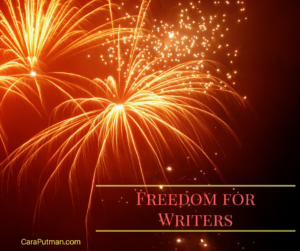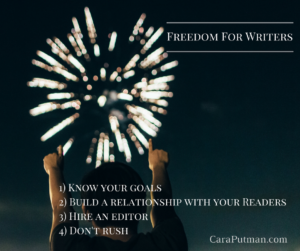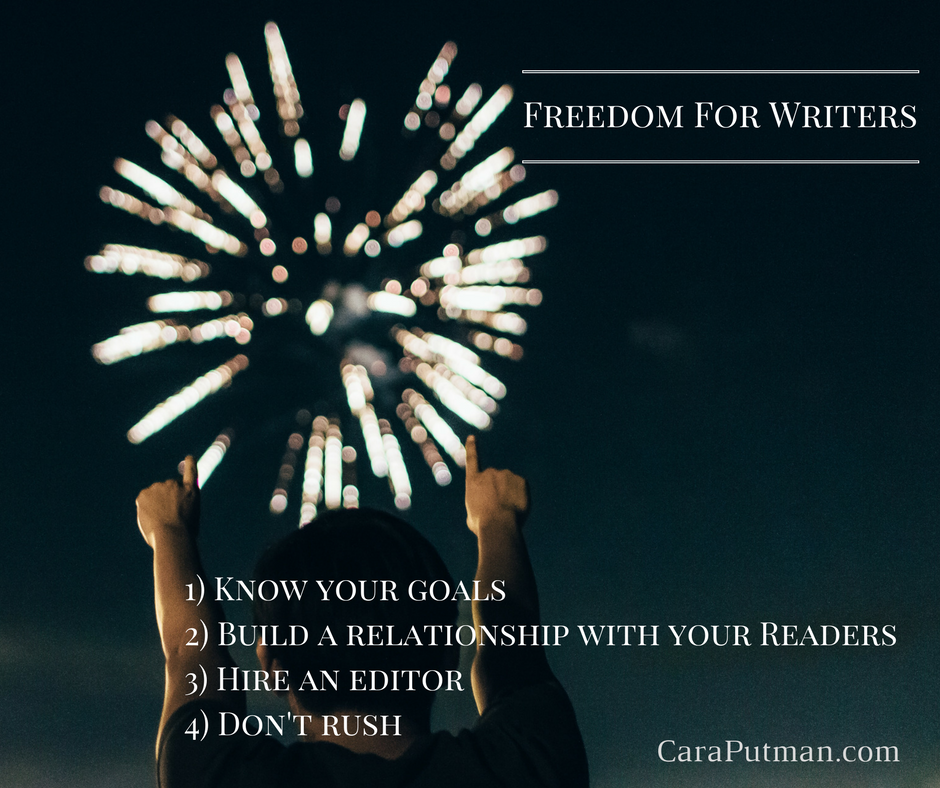
Last week we celebrated the Fourth of July, and over on a Facebook group I’m part of we talked about how it’s a great time to be a writer because independence is achievable. Today I want to share some thoughts and see what you would add.
1) Know your goals. Why do you want to write indie? What is motivating that decision? The same questions should be asked if you’re pursuing traditional publishing. For me, I’m pursing indie for my books where I have received the rights back from the publisher. It’s been a huge learning curve, but I know these are good books and there are readers who haven’t discovered them. Indie publishing is a way to get them back out there, update them and more. I love traditional publishing, because I love the partnership aspects. I know they have a platform I don’t have on my own. They have the team to help me with all the elements that are overwhelming to consider on my own. That’s why I love being with the big houses.
 2) The most important relationship is between reader and author. Regardless of how you publish, you have to think about how you will build that relationship. Part of it will be writing more, great books. Then there will be websites, social media, booksignings, etc. you will have to think deliberately about how you will build this relationship. It also requires you to know and listen to your reader. Involve them in the process. Help them acquire ownership of your books. How can you help them become your biggest advocates?
2) The most important relationship is between reader and author. Regardless of how you publish, you have to think about how you will build that relationship. Part of it will be writing more, great books. Then there will be websites, social media, booksignings, etc. you will have to think deliberately about how you will build this relationship. It also requires you to know and listen to your reader. Involve them in the process. Help them acquire ownership of your books. How can you help them become your biggest advocates?
3) Hire an editor. This step is so often overlooked. If you are traditionally published, then you should have three rounds of editing: macro/story edit, line edit, and proofing. If you are indie, you need the same. Even though the book I have put up were edited at least three times, I still hired someone to proof each one. It’s amazing what is caught each time. The quickest way to lose a reader is to have a poorly edited book. Don’t skip this step. It is worth the expense to make the book is done well. As James Scott Bell says you’re best marketing is the book the reader is currently reading.
4) Don’t rush. Let’s face it. We all get important. But let’s not rush into print before we’re ready. I have friends churning out 4-6 books a year. I can’t do that with everything else going on in my world. Three is about my max; four if I’m writing two with Tricia Goyer. I know that’s my pace, and I know this after writing 27 books. What’s your pace? How fast can you write and still do a good job? Seriously stop and think about. How much time do you need to make sure you’re going through the rounds of edits and putting out a great book? Is your first book really ready for the world to read?
What would you add to this list? If you’re a reader, have you read books that just weren’t ready? What would you tell the author if you could?

